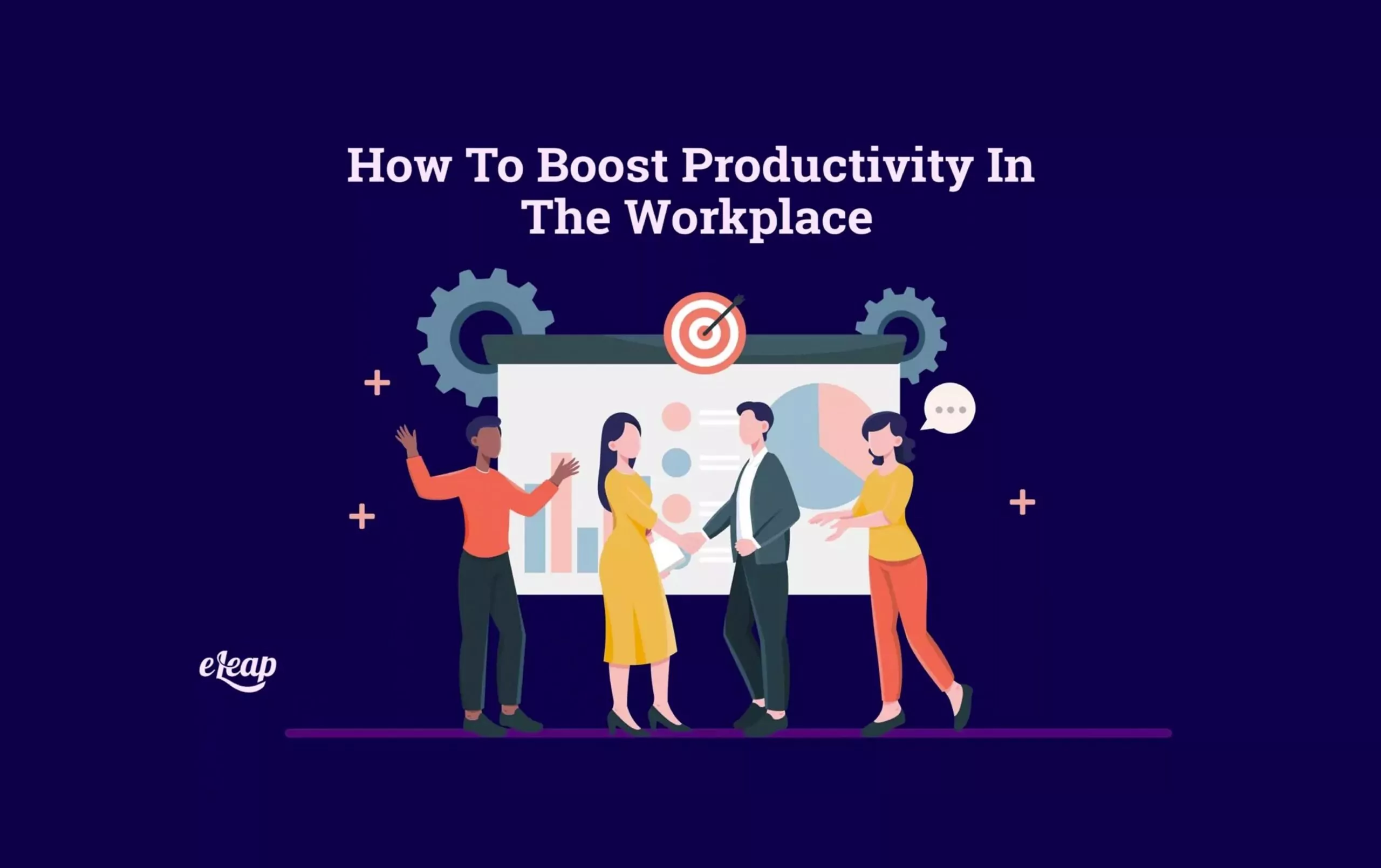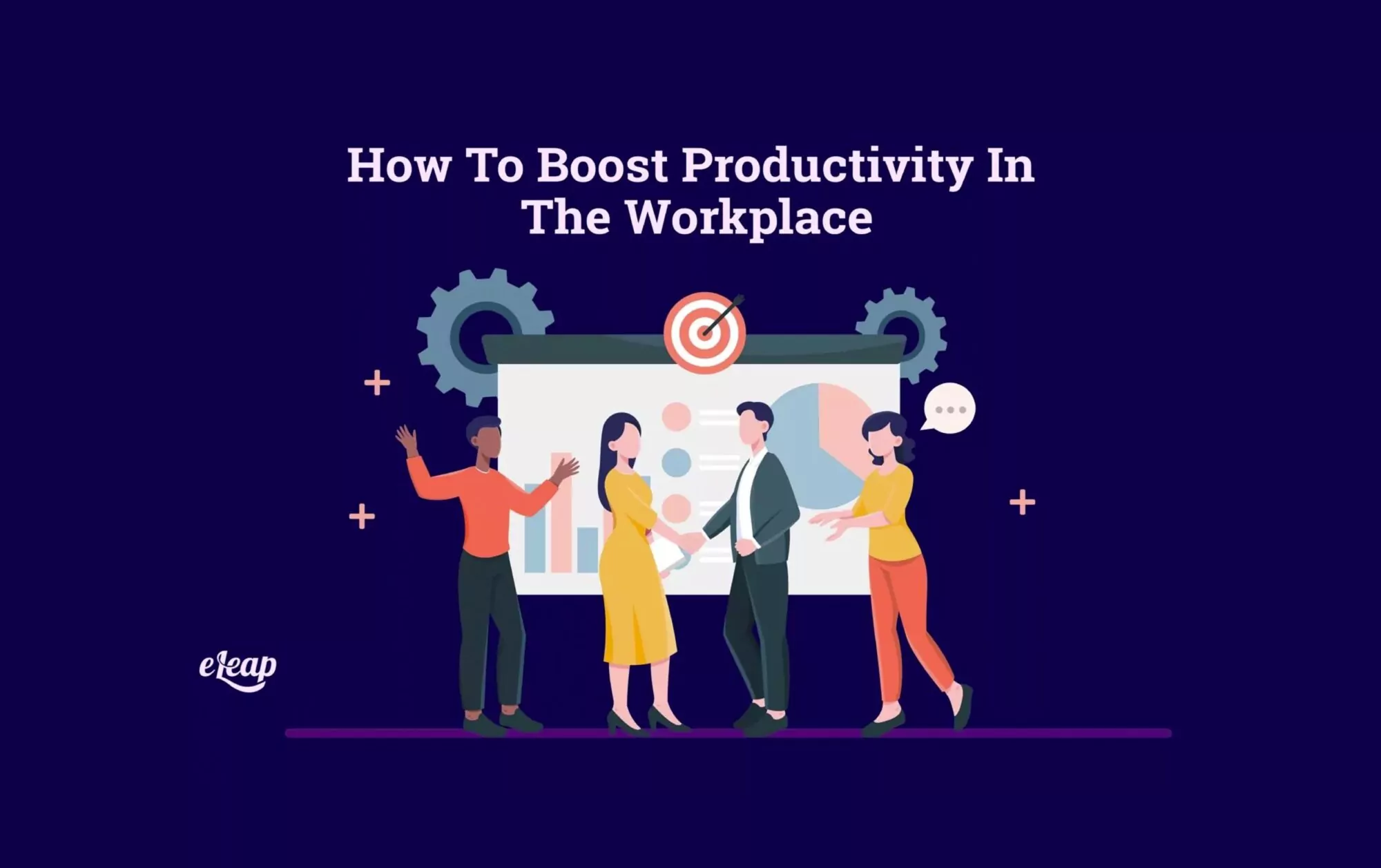How to Boost Productivity in The Workplace

Since productivity is an important piece of any successful team, you may wonder how to boost productivity in your workplace. The level of productivity someone is naturally capable of depends on a few factors, such as emotions, motivation, level of knowledge, and more.
Regardless of an individual’s natural tendency toward productiveness, everyone can learn new habits that make them more productive. There are many tricks that both employers and employees can utilize to boost productivity throughout the workday.
Research on How to Boost Productivity
Luckily, loads of studies were performed on productivity in humans. From these studies, we can understand what motivates our brains to work harder with fewer distractions. Using the information obtained from the research, employers and employees can change their habits to boost productivity.
Rewards and Motivation
One study on motivation was conducted by Katherine L. Milkman, Julia A. Minson, and Kevin G. M. Volpp. They wanted to examine what facilitated higher motivation to work out among a group of college students who reported not exercising as frequently as they wanted.
They took a group of 226 college students to participate in the study. The group was then split into 3 subgroups, who all received different resources to motivate them to go to the gym.
- Group 1 got an iPod preloaded with popular audiobooks. They were told they could only listen to their iPod in the gym and only had the audiobooks for 10 weeks.
- Group 2 also got the audiobooks, but for free and with no stipulations, they could listen at the gym or anywhere else they’d like.
- Group 3 was the control group. They got one gift card and were encouraged to work out more often.
Which group do you think had worked out the most at the end of the study? It was group one. The first group outperformed group two by 29% and group three by 51%.
What this shows is that having a reward that’s only accessible if a certain task is done (i.e., only being able to listen to your audiobooks if you are at the gym) motivates people to be more productive.
While all groups got some sort of reward, only group one had strings attached to their reward. That group outperformed the others by a lot. This shows that rewards are valuable to our motivation, but only if they come with stipulations.
In the workplace, this transfers over as well. If everyone gets a certain perk, no one will feel very motivated to work for that perk. However, if a perk can only be attained by completing a certain task, people will feel motivated to do the task.

Multitasking and Productivity
Can you multitask efficiently? This is often a question asked in job interviews and can even be a metric on an employee’s performance review; but should it be?
Although modern workplaces put a lot of value on someone who can keep up with multiple tasks at once, studies show it may not be best for productivity. In the early 2000s, Joshua Rubinstein, PhD, Jeffrey Evans, PhD, and David Meyer, PhD, set out to analyze what effects multitasking had on productivity.
The study showed that doing more than one task at a time causes a decrease in productivity. It showed that this was especially true if someone tries to juggle multiple complex tasks at a time. Psychologists agree that the mind is not made for heavy multitasking.
In short, when more than one task is being worked on at a time, the quality of work for all tasks declines. Instead, prioritization of tasks should be stressed. The best way to stay efficient and productive, without multitasking, is to make a list of priority tasks and tick them off, one by one.
Breaks Boost Productivity
Although some may disagree, working through your lunch break is not the best way to get more done. In fact, a study done in 2011 at the University of Illinois can prove this.
84 participants were asked to focus on a repetitive, computerized task for hours with different distractions. The groups were all given a set of numbers to memorize at the beginning of the task. Group one worked straight through the task with no breaks and had to recall the set of numbers at the end.
Groups two and three were given a set of numbers at the beginning. However, these groups got two breaks throughout the task.
For those who weren’t given a break, performance declined severely throughout the task. Surprisingly, for those who were given short breaks, performance remained static throughout the task.
This study suggests that a break, even if it’s short, allows our brains enough time away from the task to process and come back fully focused again.
In the workplace, this has value. It’s common for employers to approve of employees working through their lunch break – after all, they’re using their own time to get more work done, right? According to this study, an employee who skips lunch to work may be less productive than the employee who gives themselves time to take a break.
Shared Goal Setting Boosts Productivity
A study by Priyanka B.Carr and Gregory M.Walton wanted to find out if teams working toward a shared goal are really happier and more productive than those who aren’t.
Two groups were created, one that shared a team goal and one that did not. In the group that shared the goal, participants worked longer on the task and expressed greater interest in the work. In addition, this group required less self-regulatory monitoring to stay on task.
This study also found that participants who were in the group with the team goal came back to the activity they were asked to do in the study, 1-2 weeks later in an unrelated environment, on their own accord.
This study shows how important a strong team culture is. Team morale can literally change the output of work produced. The study suggests humans are naturally inclined to seek connection and work harder toward goals that will affect the whole and not just the individual.
Tips to Boost Productivity in Your Workplace
Looking at decades of research done on productivity, one thing is clear: there are ways to manipulate environments and processes to make people more productive.
Though every employee is different, there are steps workplaces and individual employees can take to ensure a more productive workday for all.
-
- Take breaks. Research shows that taking breaks and coming back to tasks after do not hinder performance. In fact, breaks are shown to increase focus and motivation for the task at hand.
- Set self-imposed deadlines. All workplaces have real, tangible deadlines for projects. However, some of these deadlines may be months away from when a task is started. For this reason, it’s helpful for employees to set self-imposed deadlines.
- Engage in less multitasking. Though it may seem counterproductive, engaging in less multitasking in the workplace boosts productivity. When employees are encouraged to only focus on one task at a time, they can exert their full efforts, making tasks quicker and producing higher quality end results.
- Try working in 90-minute intervals. Research from Florida State University found that elite performers (among musicians, chess, players, and athletes) who work in 90-minute intervals are more successful than those who work for longer intervals.
- Exercise. According to a study in the Journal of Occupational and Environmental Medicine, exercise breaks can boost productivity. Even a short walk around the block during a workday can allow employees to clear their minds and come back more motivated.
- Minimize interruptions and/or distractions. This one is a no-brainer: unexpected interruptions are found to put a wrench in focus and productivity.
- Work toward team goals. Research shows that teams who work toward a unified goal are more productive.
- Track time spent on tasks. Sometimes, employees may spend more time than needed on low-priority tasks, like checking email or team messengers. Encourage employees to track how much time they spend on each task and adjust as needed.
Bottom Line
Everyone wants to be more productive. With optimized productivity, employees finish projects more efficiently and with fewer errors. Implementing productivity hacks helps employees feel less stressed at their jobs. By maximizing productivity through these tips, both the employee and the organization benefit greatly.
Research shows clear trends in what actions have positive effects on our productivity. So, share this information with your team. Or better yet, implement daily rituals that boost productivity with your team, such as planned breaks or clear team goals. Greater productivity is a win-win for everyone!